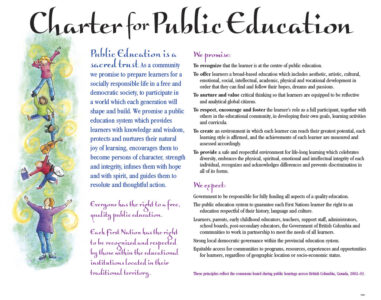Decolonizing the Charter for Public Education
As stated in the post below, the Charter for Public Education was developed in 2003 through an extensive community consultation. The IPE/BC Board of Directors believes that the Charter has great potential as a lens for examining the values and commitments in place in each BC public school and is dedicated to a project that will provide tools to support school communities in using it.
The extensive Charter for Public Education report and the Charter itself were written by a dedicated panel of five who travelled the province in 2003 to hear from students, teachers, parents, administrators, trustees and community members about their perspectives on public education. There was tremendous engagement in the process and, at the end, the panelists drafted a thorough report on what they had heard in communities around BC and designed a charter reflecting the values, commitments and expectations expressed.
In crafting the Charter, the panelists used a quotation that they believed captured the importance of public education. However, the quotation is by Egerton Ryerson, who we now know was a key influence in the design of the “Indian Residential School” system and in the creation of separate schools for Black students. The remaining four panelists (sadly, panelist George Watts passed away in 2005), agreed that the quotations should be removed, and IPE/BC moved ahead to do so. The Charter poster that you see with this post reflects this important change. The Board of Directors of IPE/BC is further committed to a process of meaningful examination of its work with a decolonizing lens.
The Development of the Charter for Public Education
In 2003, British Columbians expressed their hopes and dreams to a panel travelling the province working to develop a framework for future decisions about public education. The panel members heard passionate dialogue about education from thousands of people in 42 communities around the province and received 620 written submissions. The full report from these consultations provided the basis for development of the Charter.
Although the Charter was an initiative of the BCTF, the panel represented a range of community interests. An Anglican priest, Rev. Margaret Marquardt, chaired the Charter panel. The other members were: Dr. John Moss, a former superintendent of schools; Kathy Whittam, a step-parent of a student with special needs; George Watts, former president of the Nuu-chah-nulth Tribal Council; and David Chudnovsky, past-president of the B.C. Teachers’ Federation.
The result was The Charter for Public Education, published in 2003, as a starting point for dialogue and change in public education.
These questions were posed at each hearing:
- What is an educated person; what are their characteristics?
- Which of these characteristics are developed through the public schools?
- What is an educated community?
- What are the principles of public education?
The Charter was an inspiration for educators and communities beyond the borders of B.C., as well as a touch point for ongoing efforts to strengthen public education in B.C. Its principles have stood up well over time.

